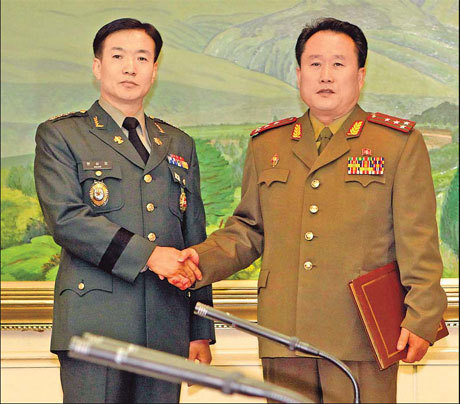Top News
DPRK-ROK talks break down
By Bao Daozu (China Daily)
Updated: 2010-10-01 08:10
 |
Large Medium Small |
|
Republic of Korea Colonel Moon Sang-kyun (left) and his DPRK counterpart Colonel Ri Shin-kwon pose before their talks at the Peace House on southern part of the truce village of Panmunjom in the demilitarized zone in Paju, north of Seoul on Thursday. Although the DPRK and the ROK had not held working-level military talks since 2008, Thursday's talks ended in failure. [Agencies] |
BEIJING - The first military talks in two years between the Democratic People's Republic of Korea (DPRK) and the Republic of Korea (ROK) ended without progress on Thursday, as Pyongyang refused to apologize for the sinking of an ROK warship.
The talks were previously perceived as an opportunity to ease months of tensions within the Korean Peninsula, but broke down in two hours due to rifts over the fate of the Cheonan, the ROK corvette naval ship.
The "ROK strongly urged the DPRK to admit to apologize for and punish those responsible for the attack on the Cheonan warship", the ROK Ministry of Defense said in a statement.
The DPRK, while denying the accusations, had hoped the talks would instead focus on humanitarian issues, according to China Central Television (CCTV).
Inter-Korean ties have soured since Pyongyang conducted several missile and nuclear tests in recent years. The military exchange came to a pause after the last such meetings took place on Oct 2, 2008.
Mutual distrust even deteriorated as Seoul asserted that Pyongyang was involved in torpedoing its warship, with the backing of Washington, while Pyongyang vehemently denied any role.
Meanwhile, the DPRK vowed on Wednesday to bolster its "nuclear deterrent" in response to the threat posed by the United States.
Addressing the UN General Assembly, DPRK Vice-Foreign Minister Pak Kil-yon said the country's nuclear deterrent can never be abandoned, but should be further strengthened "as long as the US nuclear aircraft carriers sail around the seas of our country".
Meanwhile, Pak said as a "responsible nuclear weapon state," the DPRK is ready to support international non-proliferation efforts.
The remarks were regarded as a new blow to international efforts to bring the country back to the disarmament table, after Pyongyang threatened last year to permanently withdraw from the Six-Party Talks. The talks consist of a multilateral approach, with engagement by China, US, Japan, Russia, the ROK and the DPRK, aiming at nuclear non-proliferation on the peninsula.
Even though Pyongyang had within the last month expressed its conditional willingness to be back at the negotiating table, the ROK had persistently set Pyongyang's apology for the Cheonan incident as a prerequisite for a resumption of the stalled Six-Party Talks.
In recent months, the DPRK has shown some conciliatory overtures in the form of proposing of military talks with the ROK, plans for reunions for separated families and the acceptance of humanitarian aids from its southern neighbor.
However, Pyongyang was also prepared to play hardball.
For one thing, it slammed the results of the international team's report on the Cheonan incident, which appointed Pyongyang as the perpetrator, and threatened to retaliate against a series of naval exercises staged off the ROK coast as a show of strength.
The US Central Intelligence Agency chief, meanwhile, will visit Seoul this week to exchange information about the apparent start of a power transfer in DPRK, according to AFP.
US assistant Secretary of State Kurt Campbell also said on Tuesday that he would visit Japan and the ROK next week to discuss the possible changes in the DPRK's political scenario.
Foreign Ministry spokeswoman Jiang Yu said on Thursday that frequent bilateral talks are being held among Six-Party Talks members to facilitate the possible resumption of the talks.
"Despite the ups and downs within the peninsula, the fundamental nuclear policy of the DPRK will stay consistent," said Wang Fan, an expert on Korean Peninsula studies at China Foreign Affairs University. "The country will abandon its nuclear programs in the long term."
The result of the recent meeting of Worker's Party of Korea, he added, "showed that the DPRK has experienced smooth transition. Therefore its policy will be predictable."
And the possibilities for the resumption of the disarmament talks still remain.
"It is a positive signal that concerned parties are willing to exchange viewpoints on a frequent basis. China is sure to provide all necessary means for the talks to reopen."
But, he added, it is not likely that hostilities will be eradicated overnight. Rather, "only when trust, consensus and information have accumulated to a certain extent that the negotiations are to reconvene."
He Wei, Wang Chenyan and AFP contributed to this story.
